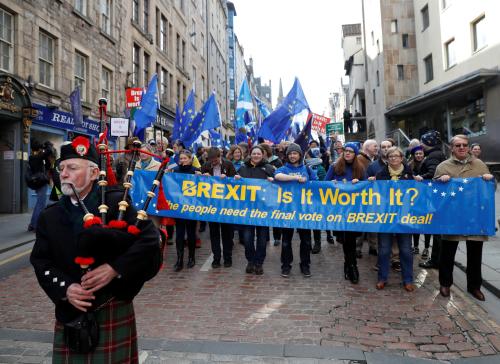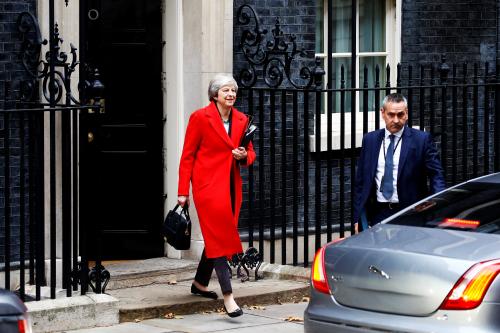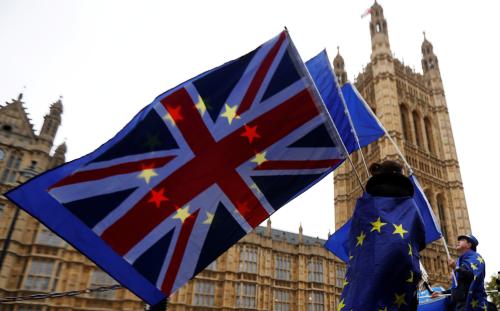This op-ed was originally published by The Hill.
It should come as no surprise that Prime Minister Theresa May’s proposed Brexit agreement fails to achieve expectations for a better deal than the one already provided by Britain’s current EU membership.
The besieged prime minister’s best argument is that the deal reflects the will of the people who voted in favor of Brexit in 2016. It meets the “Brexit means Brexit” standard. But only just.
May’s deal covers four key areas:
- the future status of residents in one another’s countries;
- ongoing payment obligations by the U.K. to the EU;
- the specifics of the relationship over the March 30, 2019 to Dec. 31, 2020 transition period;
- and the Irish backstop, involving the relationship between Northern Ireland, Great Britain, and the EU.
Most of the critical future relationship issues appear in a seven-page political declaration subject to later negotiations. During the transition and for the foreseeable future, this deal would relegate the U.K. to rule-taker status.
To “leave” advocates who predicted the EU would drop its insistence on adhering to its fundamental treaty-based “Four Freedoms” in order to maintain single-market access, the negotiations offered a rude awakening.
The ensuing process exposed Brexit advocates as woefully ignorant of the scale and complexity of the relationships that the U.K. forged as a member of the EU. Or worse.
While it remains more likely than not that a “no deal” Brexit will be avoided, politics and process over the next four-plus months make it more possible than ought to be the case.
If May survives attacks from within her own party, can she muster the votes in Parliament to pass a deal? If she cannot, what next? Following are some scenarios.
New relationship
Members of Parliament (MPs) may soon realize May’s deal is the best option. A majority could still vote for it. Those focused on more freedoms to impose immigration controls could portray the deal as a success.
Approval would largely represent continuity of the status quo for most businesses, investors and individuals and would reduce uncertainties and risks of a disruptive hard Brexit. Passage would reduce the specter of a government led by Labour Leader Jeremy Corbyn, whose positions represent the U.K.’s most radical left-wing agenda in generations.
New leader
May is currently at risk of a no confidence vote, led by anti-deal Brexit supporters within her own party. Triggering a vote requires 48 letters, but actual removal of the prime minister requires 158. It is far from obvious that anyone else can garner sufficient support within her party to take over.
If the no confidence vote fails, May is untouchable for at least another year. If it succeeds, her successor would likely oppose the current deal and support a hard(er) Brexit.
New elections
The rejection of May’s proposed deal could lead to new elections. May, having fended off Tory rebels, could lead the party against Labour in a de facto vote on her deal.
If May wins, the “new relationship” scenario results and the deal proceeds. If Labour wins, approval is still likely, followed by a different, but still constructive, path of negotiations over the terms of the future relationship with the EU.
New referendum
Former Prime Minister Tony Blair is among those advocating a new “People’s Vote,” arguing that the proposed deal reflects the reality of what Brexit really means, something unclear at the time of the referendum. Recent polls show a shift toward “remain,” holding a 54-46 majority.
Under a referendum, voters could be presented with a choice of the following: 1. remain; 2. May’s deal (“soft Brexit”); or 3. hard Brexit (in which the U.K. rejects the negotiated option and exits anyway).
That makes a referendum complicated, given the likelihood that no one option would command a majority, potentially muddying, not clarifying, the situation.
New deal
Some opponents of May’s deal seek to re-open negotiations. EU negotiators, both in Brussels and in powerful member states, including Germany, have rejected this option. Given this, the general framework of the agreement is unlikely to change.
New deadline
While the U.K. is preoccupied with national politics, the EU is looking ahead to European Parliamentary elections scheduled for May 2019. Expectations are that the U.K. will not be fielding any candidates. An extension of the March 29 Brexit deadline is unlikely, as it could upset delicate European political dynamics.
New vote
If the May deal is voted down in the House of Commons, there could be a dramatic financial market sell-off. Such a reaction could force a re-think of enough MPs to re-vote to approve the deal, though bipartisan support for May’s deal (or any other) seems unlikely.
Many Tory opponents seek an entirely different style Brexit and market reactions are unlikely to dissuade them. May’s current governing majority is slim and dependent on votes from Northern Ireland’s Democratic Unionist Party party, which has already expressed opposition to the deal.
Labour MPs, who could theoretically provide a margin of victory, are politically driven and a financial market meltdown will not likely sway them. Bipartisan support for May’s deal (or any other) remains unlikely. Labour outperformed expectations when May called a snap election in 2017, and they sense that any new election could restore them to power.
No deal
Hard Brexit supporters have long argued “no deal is better than a bad deal.” The short- and medium-term impact of “no deal” would be deeply disruptive to the U.K. economy and its residents’ lives. In the immediate term, contingency measures held in abeyance would need to be enacted en masse.
Temporary ad hoc measures would be required to ensure that security, air travel, medical supplies and other essentials would continue with minimal disruption. Yet, no expedited mechanism exists to agree and implement such measures.
In spite of the limited support for a no-deal Brexit, it remains the default scenario, absent an affirmative vote for something else.
Never mind
Once all the protagonists absorb how limited the U.K.’s options are, it might dawn on enough MPs and the public that the country’s vote to leave the EU grossly underestimated the complexity of the relationship, its costs and potential consequences.
While short of a new referendum, the lack of good options could result in a majority supporting the revocation of the formal triggering of the Brexit process under Article 50. It remains legally unclear whether the U.K. could unilaterally withdraw its Brexit notice.
However, it seems politically likely that, if requested early enough, a way could be found to allow the U.K. to do so.
This “never mind” scenario would allow the U.K. to remain in the EU and reap the benefits of membership, but not shut off debate about legitimate concerns about Europe’s future; only this time, with a more realistic assessment of what is at stake.
The EU, following elections next year, could also begin to tackle issues raised not only by the U.K., but also by others seeking fundamental reforms in Europe.
An EU with an active and contributing U.K. as a member could well move in a direction that benefits both sides.







Commentary
Op-edNegotiations have been a rude awakening for Brexit supporters
November 21, 2018